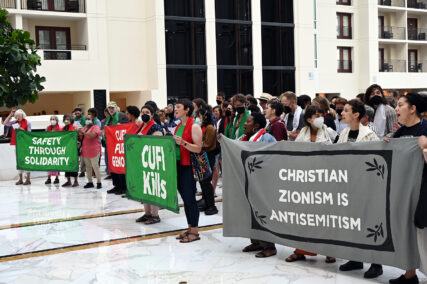
An interfaith group of pro-Palestinian protesters interrupts the Christians United for Israel summit inside the Gaylord National Resort and Convention Center, Monday, July 29, 2024, in National Harbor, Maryland. (RNS photo/Jack Jenkins)
NATIONAL HARBOR, Md. (RNS) — When John Hagee, founder of Christians United for Israel, spoke Monday night (July 29) at the group’s annual summit, he did so with the kind of theological self-assurance that has defined his decades of pro-Israel activism.
“We cannot call ourselves followers of God’s holy and enduring mandate if we fail to stand with Jerusalem,” said Hagee, 84, who is senior pastor of Cornerstone Church in San Antonio.
But as Hagee spoke inside a convention center on the Potomac just south of Washington, anti-Zionist activists with Jewish Voice for Peace quietly maneuvered 25 kayaks into a tight line in the river outside. As the sun set over the water, the kayakers hoisted a banner. It read: “CUFI kills.”
It was one of several rolling protests organized by Interfaith Action for Palestine, a coalition of pro-Palestinian activists who oppose Israel’s ground assault in Gaza. For nearly three days in and around Washington, its 700 participants, according to organizers, challenged Hagee and CUFI, the largest pro-Israel group in the U.S., with sit-ins, street closures, singing protests and more calling for a cease-fire in Gaza and the end of U.S. arms sales to Israel.

John Hagee speaks at the Christians United for Israel summit, Monday, July 29, 2024, National Harbor, Maryland. (Video screen grab)
CUFI, the flagship organization for conservative Christians’ broad-based support for Israel, claims more than 10 million members — a number which, the protesters frequently noted, exceeds the number of Jews in the United States. “The majority of support in the U.S. (for Israel) doesn’t come from the Jewish community,” said Rabbi Abby Stein, who came from Brooklyn to help lead some of the protests. “I think it’s very important to understand where that power comes from.”
CUFI leaders did not immediately respond to requests for comment on the protest.
On Monday, dozens of protesters gathered outside the entrance to the main hall in the Gaylord National Resort and Convention Center holding signs that read “CUFI Funds Genocide” and “Christian Zionism is Antisemitism” and singing songs with lyrics advocating for “cease-fire now,” and “into plowshares turn their swords, nations shall learn war no more.”
A handful of CUFI summit attendees confronted the demonstrators, but most looked on quietly. As the protesters processed out of the hotel, some summit attendees extended their arms and prayed over the group as it passed.
The interfaith activists convened across the street from the hotel, where leaders and representatives from various groups offered prayers and songs. Lydia Kuttab Brenneman, a Palestinian Christian and Mennonite chaplain, adapted the words of the Bible’s Psalm 13:
“Where are you, oh God?” she prayed. “Sometimes we even ask, where are the Christians in America? Where are the Christians in the West? We cry out with our brothers and sisters in Palestine, and we ask, how long, oh God? When will the cease-fire happen?
“We’ve been praying,” she said. “When will the genocide end? When will the killing of innocent children end? When will there be justice? When will the American church walk with us?”

An interfaith group of clergy and other pro-Palestinian protesters blocks buses filled with attendees for the Christians United for Israel summit in National Harbor, Maryland, Tuesday, July 30, 2024. (RNS photo/Jack Jenkins)
On Tuesday morning, a group of pastors, rabbis and seminary students blocked traffic near the Gaylord, forcing two buses filled with CUFI attendees to a standstill. “I’m here because Jesus spent his life and death fighting empires of supremacy and domination and building up a world where all of us can be free,” the Rev. Liz Kearny, a Presbyterian Church (U.S.A.) minister, said while protesting in the street. “Today that means blocking Christian Zionists from lobbying my lawmakers to fuel death and genocide.”
CUFI attendees were eventually escorted by police to other buses nearby, and the protest dissipated without arrests.
The protests represented a culmination of months of anti-war activism, with participants from Christians for a Free Palestine, Christians for Ceasefire, Mennonite Action, If Not Now, Jewish Voice for Peace, Rabbis for Ceasefire, Hindus for Human Rights and Muslim Alliance for Sexual and Gender Diversity working together.
Assata Hashi Ninak Aya, who works for the Muslim Alliance, said she participated in the protest blitz for many reasons, including wanting to make sure people like herself were represented — namely, a queer Shiite Muslim.
“People deny the reality that queer and trans Palestinians exist, and that they are being murdered by the dozens just like everyone else,” she said.
At one rally, Pranay Somayajula, the director of organizing and advocacy for Hindus for Human Rights, said he was raised with the idea of “Vasudhaiva Kutumbakam,” meaning “the world is one family.” Somayajula added, “There is equal and inherent dignity in all of us, and so an attack on the people of Gaza is an attack” on all of humanity.

South Carolina Senator Lindsey Graham addresses the Christians United for Israel summit, Monday, July 29, 2024, National Harbor, Maryland. (Video screen grab)
The attendees at the CUFI meeting were undaunted on Monday, responding with raucous applause when Sen. Lindsey Graham of South Carolina took the stage inside the convention center and promised to cut funding to the United Nations Relief and Works Agency, the U.N. aid agency for Palestinian refugees.
“As a young man in South Carolina, I was raised to understand that God blesses those who bless Israel, and that’s my foreign policy. It’s not that complicated,” the senator said.
Graham, like Hagee, linked Iran to violence against Israel by Hamas and Hezbollah and boosted former President Donald Trump as the best leader for U.S.-Israel relations. “We’re here tonight not only to honor Israel, but to condemn Iran,” Graham said.
The next day while advocating on Capitol Hill, Tim McMurtry, a member of World Outreach Center in Milwaukee, said he has attended more than five CUFI gatherings. “We want the blessing that’s associated with being on the side of Israel to stay with the United States,” he told Religion News Service. “We believe that the United States has been part of the power structure that it has been due in large part to that support for Israel.”

Activists in kayaks with Jewish Voice for Peace protest the Christians United for Israel summit on the Potomac River, Monday, July 29, 2024, in National Harbor, Maryland. (RNS photo/Aleja Hertzler-McCain)
CUFI attendees largely dismissed the protests. Tyler Shasteen, a junior at the University of Chicago and a committeeman for Chicago’s 5th Ward, said he attended the CUFI gathering because he is dedicated to the “Christian value of supporting peace in the world,” and he argued that the protesters suffered from an “information problem.”
“I would have to say that people who are saying that a cease-fire would bring peace in the region seem to have forgotten that on Oct. 7 there was a cease-fire,” he said. Shasteen blamed Hamas, not Israeli forces, for the more than 39,000 people reportedly killed in the Gaza Strip since the war began.
As CUFI wrapped up Tuesday afternoon with lobbying on Capitol Hill, the protests came to a climax as approximately 50 demonstrators with Mennonite Action were arrested by U.S. Capitol Police after singing about cease-fire in the lobby of the Hart Senate Office Building.
With dozens of onlookers peering out of offices and over balconies, the protesters’ song continued as they were processed for arrest.

U.S. Capitol Police arrest anti-war protesters in the Hart Senate Office Building, Tuesday, July 30, 2024, in Washington. (RNS photo/Aleja Hertzler-McCain)
“Demonstrating inside the Congressional Buildings is against the law,” a spokesperson for the U.S. Capitol Police told RNS.
While no protester claimed to have convinced either CUFI or Congress of their position — Kathy McCullaugh, a Methodist from New York with Christians for a Free Palestine, said one Hill staffer told her, ”This topic is a very emotional one” — McCullaugh said the staffer added, “I really appreciate to have this conversation guided by faith and love.”

